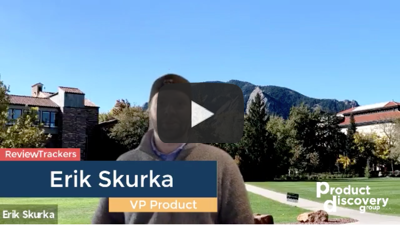Why Success is a Bad Thing for Product Leaders
Product Leader Best Practices
Written By Jim Morris
Having a product that wins in the market is extremely satisfying.
Trying to repeat that success is equally frustrating for many Product Leaders.
These failures can result from a Product Leader's “success bias.”
Did we attribute success to ourselves and our team? Or was it more important to be in the right place at the right time with just enough of a feature set?
Early in my career, I had a success that led to future failures. This “success bias” led me to waste hundreds of hours of engineering time on poorly thought out ideas.
So how did this happen?
Early Success
Four of us started PowerReviews in 2005 to bring product reviews capabilities to every online retailer. We knew product reviews were a winner. Amazon had pioneered them to great effect with books. The PowerReviews team had been at the online retailer Fogdog.com (IPO in 1999) where we built the product reviews capability for our loyal customers. They loved it and reviews increased our sales and loyalty. We knew other retailers would be interested due to research indicating that Amazon was taking business from others in part because they offered reviews.
We built a solid product reviews platform that 1,000+ online retailers purchased.
But each time we wanted to create a follow-on product...a new standalone product...we failed.
Future Failures
One of the turning points of my career came when we hired our first Product Marketer. He asked me, the Head of Product, how many people used our social network integrations. I didn’t know and it took us a week to gather the info.
When we looked at the numbers, we found that less than 1% of users ever used this product.
We had built these integrations based on market hype. We learned later that purchasers may buy on hype but won’t renew without value.
Another influential mistake was building an underdeveloped idea. We wanted to enable ecommerce shoppers to ask a question about a product for sale online. Sure enough, consumers had lots of questions but our clients, the online retailers, didn’t have enough personnel to answer the questions. So unanswered questions accumulated on their product pages. We didn’t work closely enough with our clients to plan for this outcome. One by one they removed this new offering from their site. Having unanswered questions was worse than having no questions at all.
In each instance of creating a new product, we were overconfident from our previous success with product reviews. Our “success bias” prevented us from delivering real value. We did as little as possible to close the sale. In the long run, lack of value resulted in failed products.
Make Great Products by Bringing Product Discovery to Your Company
Making great products requires Product teams to strategize like business owners while building value for users. Learning Product Discovery best practices is the fastest way to accomplish both of these goals. Teams that regularly use Product Discovery improve outcomes and morale while reducing micro management and wasted engineering time.
Contact the Product Discovery Group to get started with your teams.
For the Product Organization
Embedded Coaching with Multiple Product Teams to Adopt Product Discovery and Change Culture
For the Product Team
Facilitated Product Discovery Sprint Workshop
For the Product Manager
1:1 Coaching
For the Product Leader
1:1 Advising
Recent Articles from Product Managers
How to run remote discovery sprints that don't suck
By MaryLauran Hall, PM, AdZerk
Because many of us are in the same boat, I'm sharing my tactics and go-to resources for remote product sprints. I hope that more people can realize the benefits of discovery while we're all WFH.
When I do it again
By Jeff Martens, PM
Through my experiences co-founding and leading CPUsage from 2010-2014, here is some of what I’ll do differently next time I start a startup.
Jim Morris coaches Product teams to collaborate effectively and seek customer feedback continuously during the design and ideation phase. Contact the Product Discovery Group to learn more.









